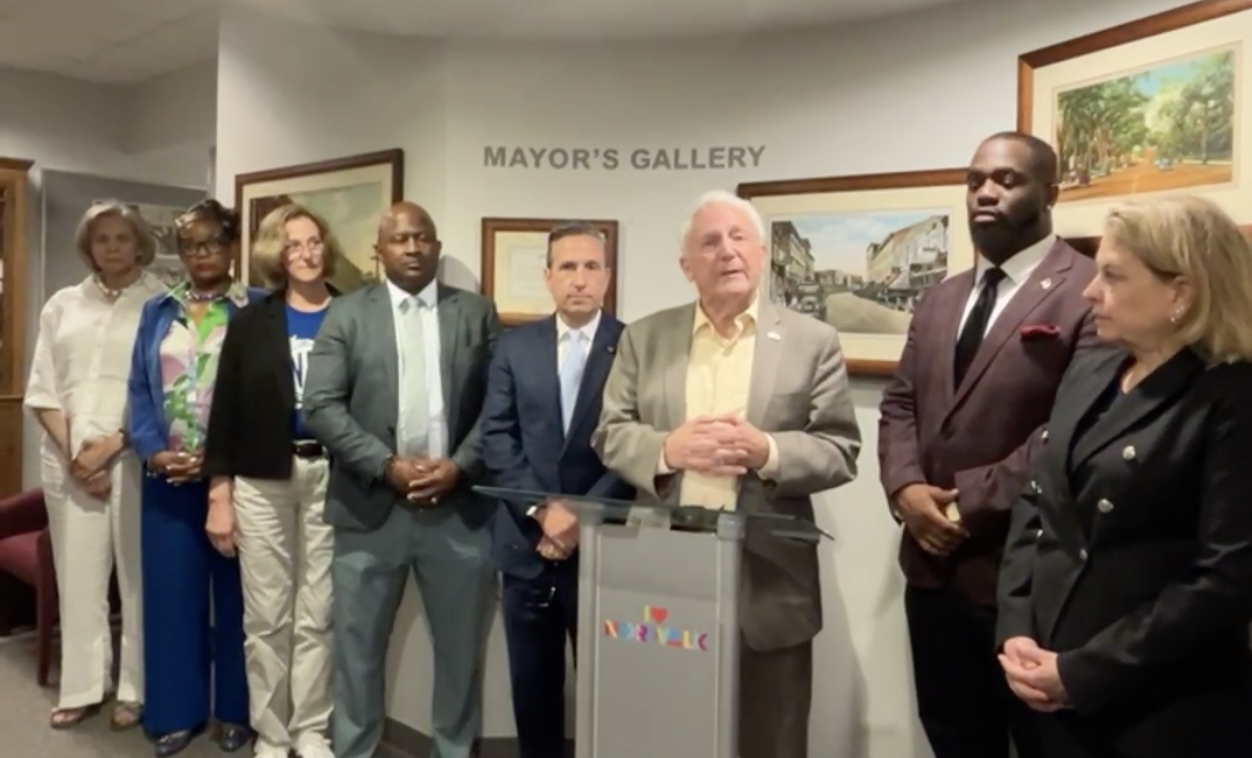Budget Drama: Norwalk Teachers Saved by New Funding, Albeit With Strings Attached; Bridgeport Waits to Make Decision
Norwalk's school district received an additional $6 million in state and local funds, while Bridgeport is waiting to see how much additional state aid it received.

Earlier this month, hundreds of parents, students, and teachers packed into Norwalk’s City Hall asking the Board of Education not to cut music and arts programs, as well as beloved teachers from their schools.
Local and state elected officials said they heard these concerns and worked to allocate an additional $6 million for the district to stave off some of these cuts.
“The public came out in large numbers and expressed their concerns about what was being cut from the budget that they felt was very important for the development of their children,” Norwalk Mayor Harry Rilling said at a press conference on June 10. “We listened and we heard.”
However, the funding came with some strings attached, and blurred some lines about who has say in the school district’s budget. The additional funding—an additional $3 million from the state and an additional $3 million from the city—was a joint effort between Rilling, State Senator Bob Duff, and state representatives from Norwalk.
“We had some conditions we wanted to see met,” Rilling said.
Those conditions include requirements that the funding be used to keep the music and arts programs at the same level they are at now, have the school district provide a line-by-line budget during next year’s cycle to avoid “another budget crisis,” that the board and school district officials work with union leaders on any cuts, and that any contract negotiations with the superintendent be put off until after next year’s budget is reconciled.
After days of negotiations, the Board of Education and school officials said they agreed with the proposal and will accept the additional funding. This will officially be finalized at the June 17 meeting.
“This additional funding allows us not only to preserve band and string programs, which are vital to a well-rounded student experience, but also to support staff benefits and give school leaders flexibility to meet the unique needs of their buildings,” said Superintendent Dr. Alexandra Estrella in a statement. “These decisions reflect our ongoing commitment to educational excellence, equity, and responsible stewardship of public resources.”
Contentious Back and Forth
The result of these negotiations was positive for students and teachers at Norwalk Public Schools. Elementary band and strings positions were reinstated, and additional funds were given to schools in an effort to allow principals to “reinstate student-facing staff based on each school’s individual needs,” according to a statement from the district.
However, the process that brought about the additional funding was contentious and pitted city and state officials against school district leaders.
In the June 10 press conference, Duff said that the budget issues were a “manufactured crisis, because back in January when we knew we were going to have some budget challenges, I said to the Superintendent, ‘Trust the process.’”
Duff said that he told Estrella at the time that he would be “working to get additional funding for Norwalk,” a sentiment he repeated in March.
However, none of the additional funding was final until the state legislature approved a budget last week and Governor Ned Lamont signed it. At that same time, the school district was working with the budget as it was and had to address a gap between the amount it requested from the city and the amount it received.
The school district asked for a 9.7% increase, or about $22 million. The city provided a 4% increase, leaving the Board of Education to trim its budget by $13 million. Because of that, school officials presented a plan that would cut more than 100 teaching positions, eliminate music and band at the elementary school level, and more.
Rilling said at the press conference the Board of Education initially felt that some of the conditions were “usurping their authority,” as the board is responsible for allocating how funds are spent.
“Any such discussion must be thoughtful and consistent with the separate roles and responsibilities of the Board of Education and the City under statute,” members of the Board of Education wrote in a June 10 statement. “We will be responding to the proposal after careful review.”
However, Rilling said he and Duff wanted to make sure the additional funding was spent addressing the issues raised by the community.
“The public came out in large numbers and expressed their concerns about what was being cut from the budget that they felt was very important for the development of their children,” Rilling said.
Duff also noted that “every year it seems like we have a budget crisis and we have a district that keeps asking for 9, 10, 12% increases when that is not the norm anywhere else in the state of Connecticut.”
After the back and forth, the school district put out a statement saying that officials will present an updated operating budget to the Board of Education on June 17 that restores elementary band and strings positions. In addition, the district has “identified $2 million in further budget reductions through the elimination of additional Central Office positions, scaling back professional development, cutting utility-related expenditures and other non-student-facing programs.”
“I want to thank our students, families, and community members for their passionate advocacy throughout this budget process,” Estrella said in a statement.
Rilling said that the “past few weeks have been challenging for so many Norwalk families.”
“They wondered if their kids' favorite teacher or their music and arts program would continue in the upcoming school year,” he said in a statement. “I know that many educators wondered if they would still have a job this fall, and I want to acknowledge the considerable stress that our community has endured as we worked to restore funding for these essential programs and positions. I also want to thank every parent, student, educator and resident who spoke out or sent letters to relay their concerns. I want you to know that we heard you and that your voice and efforts matter.”
Bridgeport: Wait and See
Bridgeport, another school district facing potential wide-spread cuts due to budget issues, is still going through the approved state budget and waiting to see how it will impact the district.
“One of the things that my staff and I are doing is trying to unpack the meanings of all those bills that were passed,” Acting Superintendent Royce Avery said at the June 9 Board of Education meeting. “There's a lot of misconceptions about the dollars that the district is receiving, and before I get in front of the community … I needed a little bit more time to really understand those numbers, making sure that they're accurate in my mind, in the CFO’s mind, so that we can have accurate information.”
Avery said that members of the public might be “hearing all kinds of different things about how much money the district received or didn't receive,” which is why he wanted to verify what, if any, additional funding was coming the district’s way.
“We want to make sure that we take our time in interpreting and unpacking those bills in order for us to get the right numbers out to this community about where we stand with those legislative moves,” he said.
Avery said he anticipated meeting with the Finance Committee this week and calling a special board meeting on Wednesday, June 18 to go over the final budget.
Board member Robert Traber said he wanted to “reinforce” the superintendent’s plan to wait and digest the numbers.
“You may see the city of Norwalk is in complete chaos…it’s chaotic for everybody,” he said. “We need to be careful not to misstate what's been passed and confuse people, and we can't go forward and pass a budget that's not based on accurate information.”
The board voted to table its budget reconciliation vote until a special board meeting, which is proposed for June 18.



